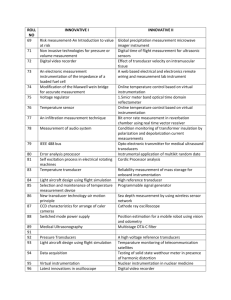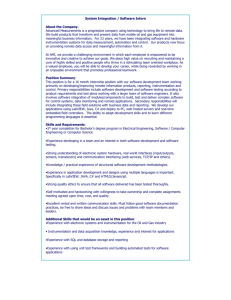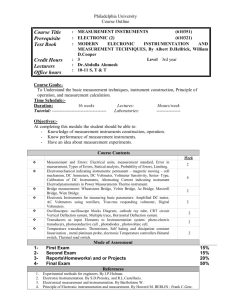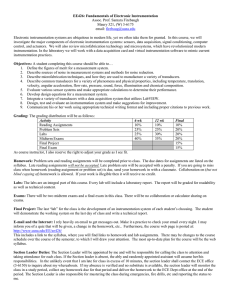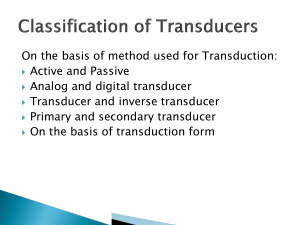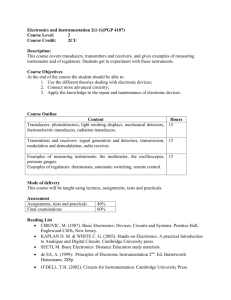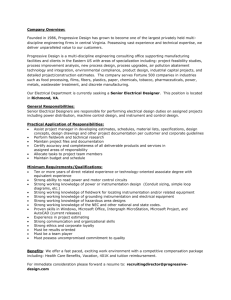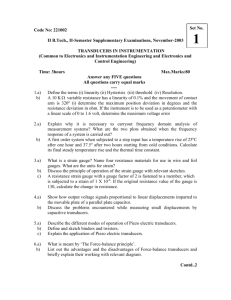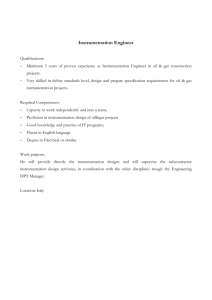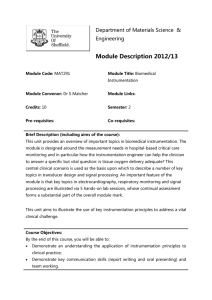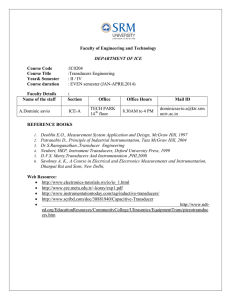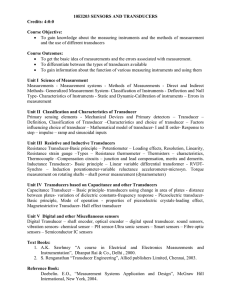Instrumentations and Measurements 0903341_syllabus
advertisement
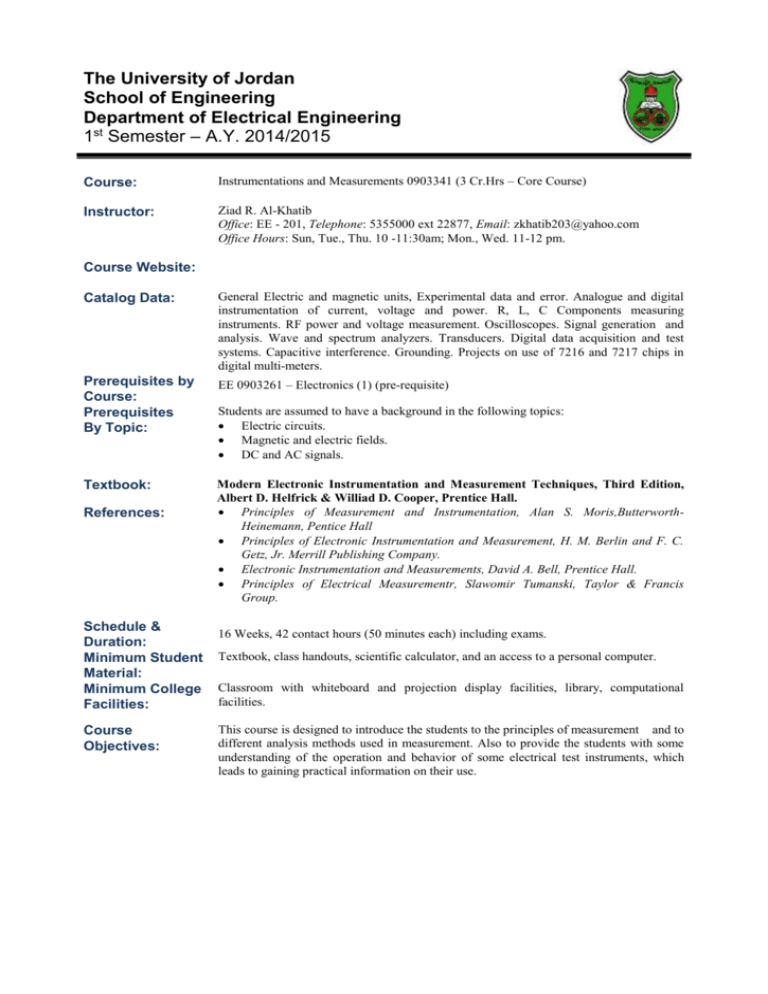
The University of Jordan School of Engineering Department of Electrical Engineering 1st Semester – A.Y. 2014/2015 Course: Instrumentations and Measurements 0903341 (3 Cr.Hrs – Core Course) Instructor: Ziad R. Al-Khatib Office: EE - 201, Telephone: 5355000 ext 22877, Email: zkhatib203@yahoo.com Office Hours: Sun, Tue., Thu. 10 -11:30am; Mon., Wed. 11-12 pm. Course Website: Catalog Data: General Electric and magnetic units, Experimental data and error. Analogue and digital instrumentation of current, voltage and power. R, L, C Components measuring instruments. RF power and voltage measurement. Oscilloscopes. Signal generation and analysis. Wave and spectrum analyzers. Transducers. Digital data acquisition and test systems. Capacitive interference. Grounding. Projects on use of 7216 and 7217 chips in digital multi-meters. Prerequisites by Course: Prerequisites By Topic: EE 0903261 – Electronics (1) (pre-requisite) Textbook: Modern Electronic Instrumentation and Measurement Techniques, Third Edition, Albert D. Helfrick & Williad D. Cooper, Prentice Hall. Principles of Measurement and Instrumentation, Alan S. Moris,ButterworthHeinemann, Pentice Hall Principles of Electronic Instrumentation and Measurement, H. M. Berlin and F. C. Getz, Jr. Merrill Publishing Company. Electronic Instrumentation and Measurements, David A. Bell, Prentice Hall. Principles of Electrical Measurementr, Slawomir Tumanski, Taylor & Francis Group. References: Schedule & Duration: Minimum Student Material: Minimum College Facilities: Course Objectives: Students are assumed to have a background in the following topics: Electric circuits. Magnetic and electric fields. DC and AC signals. 16 Weeks, 42 contact hours (50 minutes each) including exams. Textbook, class handouts, scientific calculator, and an access to a personal computer. Classroom with whiteboard and projection display facilities, library, computational facilities. This course is designed to introduce the students to the principles of measurement and to different analysis methods used in measurement. Also to provide the students with some understanding of the operation and behavior of some electrical test instruments, which leads to gaining practical information on their use. Course Learning Outcomes and Relation to ABET Student Outcomes: Upon successful completion of this course, a student should: 1. Recognize the basic terms of common measurements; accuracy, precision, sensitivity, resolution, standard deviation and error 2. Recognize the basic terms of standards in measurements; International, primary, secondary and working standards. 3. Estimate the accuracy and precision of a measurement and identify possible sources of measurement error. 4. Analyze produced measurements using statistical analysis methods 5. Design and analyze the operation of analog and digital (I, V, and O) meters 6. Solve for R, L, and C using bridges 7. Demonstrate the general operation of the Cathode-Ray-Tube oscilloscope and signal generators 8. Identify and illustrate ground resistance measurement and faults and ground loops. 9. Design and analyze the operation of impeded system in measurements; programmable system on chip technology (PSoC). 10. Select suitable transducers for certain purposes 11. Show some understanding of wave and spectrum analyzers [a] [a] [a] [a] [k] [a,k] [a,k] [a,k] [k] [a,k] [a] Course Topics: 1. 2. 3. 4. 5. 6. 7. 8. Topic Description Definition of Instrument, accuracy, precision, sensitivity, resolution and error. Systems of units. Electric and magnetic units. International system of units. Conversion of units. Standard of units. Significant figures. range of doubt. Types of error. Statistical analysis. Probability of error. Limiting error, stadards systems. DC ammeters ( Shunt resistor, Aytron shunt ). DC voltmeter ( multi-range voltmeter, voltmeter sensitivity, loading effect). Series type ohmmeter. Shunt type ohmmeter. Multi-meters (VOM). Calibration of DC instruments. Digital voltmeter. Digital multi-meter. DC bridges ( Wheatstone bridge, Kelvin bridge). AC bridges (Maxwell bridge, Hay bridge). Cathode-Ray Tube (CRT). CRT circuits. Vertical deflection system. Delay line. Multiple trace. Horizontal deflection system. Oscilloscope probes. Grounds and grounding (AC power line, ground faults, Neon and LED wire receptacle analyzer). Ground Loops ( inductive coupling, capacitive coupling, common-mode noise). Selecting transducers. Resistive changing transducer. Self generating transducer. Capacitive transducer. Inductive transducer. Frequency-selective wave analyzer. Harmonic distortion analyzers. Spectrum analysis Hrs 5 5 10 6 7 4 5 4 Ground Rules: Attendance is required and highly encouraged. To that end, attendance will be taken every lecture. All exams (including the final exam) should be considered cumulative. Exams are closed book. No scratch paper is allowed. You will be held responsible for all reading material assigned, even if it is not explicitly covered in lecture notes. Assessments: Grading policy: Exams, Quizzes, Projects, and Assignments. First Exam Midterm Exam Final Exam Total Last Updated: September 2014 20 % 30 % 50 % 100%
